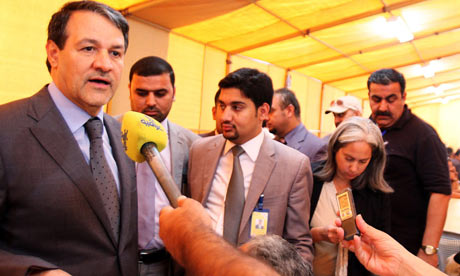Iran nuclear programme talks salvaged from collapse
Last-ditch agreement reached in Baghdad to make another attempt at a compromise deal in Moscow next month

International talks over Iran's nuclear programme were salvaged from collapse in Baghdad with a last-ditch agreement to make another attempt at a compromise deal in Moscow next month.
After two days of intense talks in the Iraqi capital, Lady Ashton, the EU foreign policy chief, said: "It is clear that we both want to make progress, and that there is some common ground. However, significant differences remain. Nonetheless, we do agree on the need for further discussion to expand that common ground."
The common ground seems limited, beyond the desire to keep talks going to forestall the threat of Israeli military action. Ashton pointed to Iran's "readiness to address the issue of 20% enrichment" – a particular concern for the international community as 20%-enriched uranium is easier to convert into weapons-grade material. But diplomats at the talks said Iran's lead negotiator, Saeed Jalili, did not explicitly offer to curb 20% enrichment.
"It wasn't easy," one diplomat said. "Jalili said he was prepared to talk about 20% enrichment but then he came up with a bunch of peripheral issues like relations with Bahrain, and events in Syria."
After the talks, Jalili told CNN that progress at Moscow would require that "measures that damage the confidence of Iranians should be avoided", an apparent reference to punitive measures such as sanctions.
Responding to the mixed outcome of the talks, the foreign secretary, William Hague, said Iran needed to take "urgent, concrete steps". He added: "If Iran fails to respond in a serious manner, they should be in no doubt that we will intensify the pressure from sanctions, including the embargo on oil imports already agreed, and will urge other nations to do the same."
The UK remained fully committed to a diplomatic solution to the nuclear impasse, he said, but added "we must see significant progress from Iran" in Moscow.
At the outset of the talks, a six-nation group of senior diplomats presented what they termed a confidence-building package, calling on Iran to stop 20% enrichment, ship all its 20% uranium out of the country and stop operations at its underground enrichment plant at Fordow.
In return, the group – the US, UK, Russia, France, Germany and China – offered nuclear fuel plates for a research reactor, help with nuclear safety at Iranian reactors and spare parts for Iran's commercial airliners.
Jalili verbally presented counter-proposals, but they were considerably more vague. First was what he termed "the operationalisation of the fatwa", a reference to supreme leader Ali Khamenei's reported religious edict outlawing the development of nuclear weapons, although it was not clear how this would be put into effect.
His second point was international recognition of Iran's right to enrich uranium, and the third point dealt with regional issues like Bahrain and Syria.
Western diplomats argued that Iran's right to enrich uranium as part of a complete nuclear fuel cycle had been suspended until Tehran could convince the international community it had entirely peaceful intentions for its programme. The six-nation group argued that such issues would ultimately be addressed in a comprehensive settlement of the Iranian nuclear stand-off, but that the two sides should first carry out smaller, confidence-building steps.
Iranian state media reports criticised the package offered to Tehran on the grounds it did not include immediate relief from sanctions, but European diplomats claimed Jalili hardly mentioned sanctions inside the meeting "because he knew he would get no traction".
As evening fell on the second night of talks, Jalili's delegation was threatening to end the negotiations without agreement on a time and venue for a further round, which would have signalled a breach in the tenuous diplomatic process begun in Istanbul last month, and a ratcheting up in tensions in the Gulf once more.
Ashton, and the Russian and Chinese delegations held separate meetings with the Iranian negotiator in the late afternoon to persuade him to agree to a further round in Moscow on June 18. His agreement was only evident in the dying minutes of the last plenary meeting.
Western diplomats conceded that less had been achieved than had been hoped, but claimed that the Baghdad meeting had met the minimum goal set by the six-nation group, of marking the start of the first serious and detailed negotiations about Iran's nuclear programme since January 2011.
A US negotiator said: "We are getting to the things that matter … this is at least the beginning of a negotiation."
European diplomats said that the threshold for the Moscow talks would be substantially higher and that failure to reach a compromise there would have to be counted as a failure. "This cannot continue like this," one diplomat said. "The pace will get faster and the benchmark will get higher."
SOURCE: CLICK HERE to read more
Leave a comment and / or appreciate the article!
CLICK HERE to read more:» http://www.radio-elshaday.de/
CLICK HERE to read more:» http://www.radio-megapower.de/
CLICK HERE to read more:» http://christliche-radiosender.blogspot.com/
CLICK HERE to read more:» http://radiomegapower-nonstop.blogspot.de/
Posted by: Daniel Ioan Notar *DJ_DANY*
Keine Kommentare:
Kommentar veröffentlichen